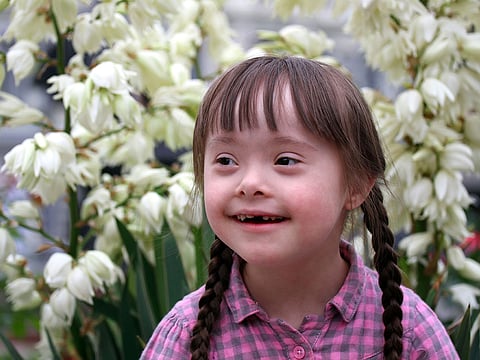Inclusion still lacking for Down syndrome-hit children in UAE
Parents call for greater acceptance of children with the condition

Abu Dhabi: Despite widespread awareness about Down syndrome, parents of affected children in the UAE say there are still many social spheres where their wards are not included.
They have therefore called for greater understanding and awareness about the condition on the occasion of World Down Syndrome Day, which was celebrated on March 21 across the world.
“My seven-year-old son has Down syndrome but he does not need sympathy from people. Instead, I want society to understand that he is as capable of excelling in life as anyone else,” Amerah Al Qubati, 32, an Emirati mother of three, told Gulf News.
“Unfortunately, we still come across many organisations and individuals who consider my child to be deficient, or are hesitant to take him in along with other children,” she said.
Al Qubati, founder of the Abu Dhabi Chapter of Emirates Down syndrome Association (UAEDSA), therefore called upon people to understand that children with Down syndrome are themselves a gift.
Down syndrome is a genetic disorder caused by the presence of a full or partial extra copy of chromosome 21. The extra chromosome alters the course of normal development, leading to low muscle tone, small stature, characteristic facial features and mild to moderate intellectual disability.
The World Health Organisation estimates the worldwide prevalence of condition to be about 1 in 1,000 births worldwide. As reported by Gulf News earlier, the UAEDSA, however, believes that the incidence is higher in the UAE. The risk of the disease also increases with maternal age at conception.
Dr Diana Kayal (left), specialist for obstetrics, gynaecology and reproductive medicine at Bourn Hall Fertility Clinic, explained that the risk of chromosomal anomalies in the fertilised embryo increases rapidly after 35 years of age.
“The risk of having an anomaly in the 21st chromosome, which causes Down syndrome, is one in 1,667 for a woman who conceives at 20 years of age. By 35 years, this risk increases to one in 378, and at 43 years, it is as high as one in 49,” she said.
Women in the UAE can undergo a number of screening tests during pregnancy to ascertain the risk of having a child with Down syndrome, including an ultrasound scan between 11 and 14 weeks of pregnancy, and other invasive procedures such as amniocentesis that samples amniotic fluid.
“Knowing during the pregnancy that their child could have a condition like Down syndrome can help couples prepare psychologically and physically for the care that has to be given afterwards, especially as many of these children require multiple surgeries soon after birth,” said Dr Fady Hachem (left), obstetrics and gynaecology consultant at Burjeel Hospital.
Parents urge schools and other social organisations to make place for children born with Down syndrome.
“I have approached a number of special needs centres to take in my 13-year-old daughter. But they look at her and say we need to work on developing her fine motor skills further before they can accept her. The challenge is that we need further specialist to do this,” said S.P., 46, a South African father of two.
S.P. said that his firstborn child has taught the family patience, and is a blessing despite the challenges she presented.


